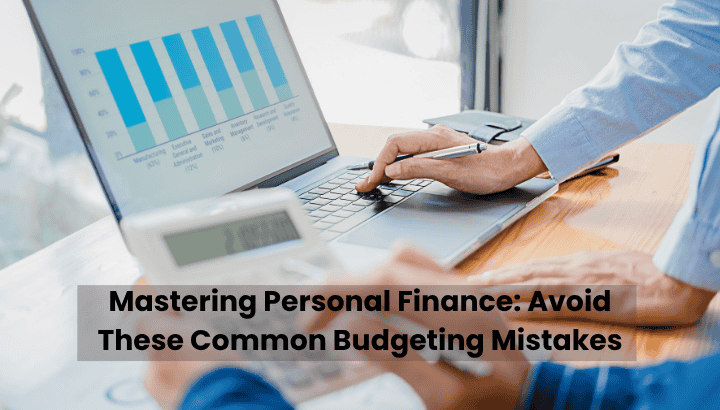Ideal personal finance management isn’t just about making money, it’s about making the use of it wisely. Most people work hard with budgeting and still make simple mistakes that stop them from moving forward. Mastering Personal Finance Avoid These Common Budgeting Mistakes
If you wish to find the best way to manage money, then it starts with avoiding these common budgeting mistakes. Let’s find out about these common mistakes and solutions to fix them smartly.
Mastering Personal Finance Avoid These Common Budgeting Mistakes
1. Not Having a Budget
The most common mistake in personal finance is not having a proper budget at all. Without having a budget, it’s simple to overspend or run out of money before the month ends.
Quick Fix: Try the most famous 50/30/20 rule, in which you spend 50% of your income on your needs, 30% on wants, and the rest 20% on savings or paying off debts. You can also use some user-friendly apps like Mint or YNAB to track your spending.
2. Ignoring Small Daily Costs
Small expenses like daily coffee, snacks, or app subscriptions seem non-threatening at first, but they add up really fast over time. Many people don’t even realize how much these small costs affect their personal finance.
Quick Fix: Make sure to check your bank statements at least once a month and cancel subscriptions which are not being used for a long time and cut down on small, daily unnecessary expenses.
3. Not Planning for Surprise Expenses
Life is full of surprises and you might face unexpected turns of events like a flat tire, a medical bill, or sudden travel. If you don’t plan for these, then they can mess up your budget and lead to debt.
Quick Fix: Create an emergency fund by saving at least $50 to $100 every month for expected costs or occasional spendings like gifts or school fees.
Read more on emergency savings planning (Investor.gov)
4. Using Credit Cards Too Much
Credit cards are a handy option to use, but using them too frequently can lead to big debt in the future, especially if you only pay the minimum amount. Many households end up with big balances they can’t pay off.
Quick Fix: Use credit cards for only necessary purchasing and make sure to pay the full amount each month before the due date. Stick to cash or debit cards for daily purchases.
Why You Should File ITR Even If You Have No Tax to Pay
5. Not Setting Money Goals
If you don’t have any idea about your money savings goals, then budgeting may feel boring or useless. So, make sure to have clear goals, which give your personal finance plan a purpose.
Quick Fix: Set SMART (Specific, Measurable, Achievable, Relevant, and Time-based) goal strategy. For example, “Save $5,000 in 12 months for a new scooter” is a clear goal.
6. Forgetting to Update Your Budget
Your financial goals, income and expenses change with time like a new job, marriage, kids. If your budget doesn’t change too, you could be overspending or saving less than you should.
Quick Fix: Make sure to update your budget every 3 to 6 months or after any big life change and check if it still fits your current lifestyle. (Check how to build better financial habits on Niti Aayog)
7. Skipping an Emergency Fund
An emergency fund is the most important part and without it, even a small financial stock can ruin your budget. It’s a crucial part of the best way to manage money.
Quick FIx: Start with small savings like $500 to $1,000 and set up an automatic transfer to a savings account so the fund grows slowly over time.
Simple Tips to Make Budgeting Work
- Track your expenses regularly by writing down in a notebook or using an app.
- Be realistic with your budget like what you can afford.
- Celebrate small wins like when you achieve a saving milestone.
- Keep learning more like books which can help you with personal finance management.
Conclusion
Personal finance management isn’t just about being perfect, it’s about making wise decisions with your money. By avoiding these common budgeting mistakes and building smart habits will help you find the best way to manage money over time.
Start from today, one step at a time, and move closer to your financial goals with confidence.

